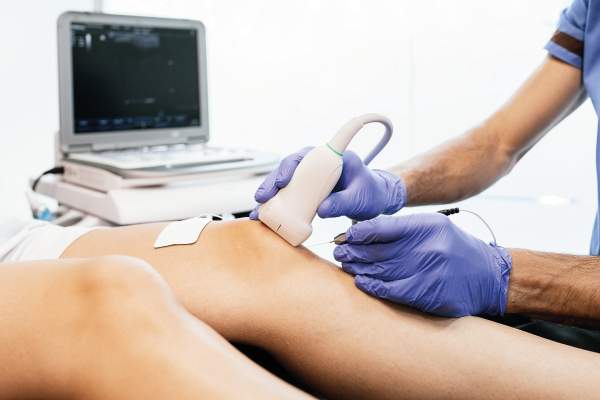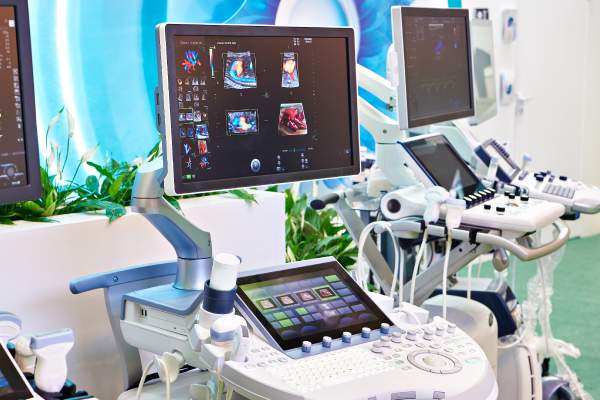How do I become a sonographer in the UK?

A sonography career can be gratifying to individuals interested in working in the healthcare sector. To pursue this career, you need to consider things such as education requirements and essential skills to succeed. Understanding the steps to becoming a sonographer will give you a deeper understanding of the career and help you decide if this career is the right choice for you. This article will answer how do I become a sonographer UK based, let's dive right in!
Who is a sonographer?
A sonographer is a healthcare worker who diagnoses and cross-examines a patient using ultrasound equipment. With the help of ultrasound equipment, sonographers can detect various health conditions and monitor the overall well-being of a patient. Ultrasound is a painless procedure than helps translate high-frequency soundwaves into images.
The images captured by sonographers make it easier for other medical personnel to observe any abnormalities in a patient’s body or check if the treatment is working as it's supposed to be.
What does a sonographer do?
A sonographer performs various medical, technical and administrative tasks. Some everyday duties include:
• Setting up the ultrasound machine. • Checking its correct functioning regularly. • Analysing ultrasound images. • Operating the ultrasound device to perform different examinations. • Handling and writing ultrasound reports for physicians and other medical personnel. • Preparing patients for an ultrasound procedure includes explaining the whole ultrasound process. • Demonstrate empathy towards your patients, reassuring them that everything is safe. • Taking care of equipment and examination rooms. • Reviewing ultrasounds results with patients and physicians.
Types of sonographers
There are different types of sonography jobs. They include...
- Diagnostic medical: Diagnostic medical sonographers work in medical diagnostics and perform ultrasounds to determine general medical diagnoses in various biological systems.
- Diagnostic cardiovascular: Diagnostic cardiovascular sonographers perform ultrasounds to determine illness involved with the heart and cardiovascular system.
- Neurosonology: Neurosonology sonographers perform ultrasounds on the brain and nervous system illnesses.
- Abdominal: Abdominal sonographers focus on the abdomen and perform ultrasounds for illnesses related to the stomach, intestines, spleen, liver and kidneys.
- Musculoskeletal: Musculoskeletal sonographers focus on the muscles and bones to determine if there’s an illness or injury.
- Obstetrics: Obstetrics sonographers take ultrasound imagery of the uterus and reproductive system of pregnant women to ensure a developing fetus's well-being.
- Skills of a sonographer
You may require a variety of technical and personal skills to succeed in a sonography job. It would be best if you also had a solid understanding of biology, anatomy and physiology. Other skills that may contribute to your success in a sonography job include...
1. Be a team player
As a sonographer, you’ll be working alongside other medical personnel such as midwives, gynaecologists, radiologists, physiotherapists, neurologists and obstetricians. Your ability to effectively collaborate with other medical personnel will determine your success as a sonographer.
2. Pay attention to detail
Sonographers usually need to pay utmost attention to detail to determine the results of an ultrasound image. As a sonographer, you need to pay attention to small details that the sonographic image might somehow miss. It's crucial to be thorough in every examination.
3. Embrace empathy and compassion
As a sonographer, you may encounter challenging emotional moments from patients. It’s essential to care for them with empathy and compassion, especially patients dealing with pregnancy or uncertain-life threatening illnesses.
4. Have practical communication skills
There are two instances where you'll use practical communication skills, when communicating with a physician, and when you are communicating with a patient. When speaking with a physician, it's essential to be accurate and use the correct terminology to avoid confusion and ensure the patient's treatment is valid. When communicating with patients, remember they come from different backgrounds, so explaining complex medical terminology in a way that a regular patient can understand is part of the job.
Sonographer salary
The national average salary of a sonography job is £46,637 per year, with salaries being paid up to £55,000 per year. The number will vary depending on your experience, employer, location, and the type of sonography you are interested in. However, Locum sonographers earn up to £55 per hour, which increases the earning potential.
How do I become a sonographer UK based?
Sonography is highly dependent on technology which is constantly changing, so sonographers are regularly updating their knowledge in the field. Sonography is just like any profession in the medical field, so it requires proper training and qualifications. For you to become a sonographer, consider the following:
1. Get an education
The most common sonography education requirement is a postgraduate certificate or a diploma in medical or clinical ultrasound, but it's also possible to pursue a master's in ultrasound. A certificate programme usually takes 12 months to complete, while diplomas and master’s degrees can take 18 months.
For overseas students who seek to get a permanent or locum job in the UK, it’s essential to enrol in a programme endorsed by the Consortium for Accreditation of Sonographic Education (CASE). CASE ensures that oversees training programmes comply with medical regulations and standards.
2. Register for an apprenticeship
After finishing your education programme, consider enrolling in an apprenticeship to gain hands-on experience as a sonographer. You can get apprenticeship programmes in The National Health Service (NHS) and private health centres. The apprenticeship programmes are equivalent to a Higher National Certificate (HNC) Or a Higher National Diploma (HND). An apprenticeship program usually runs for 36 months and will equip you with a mixture of theoretical and practical study. You will also receive a stipend for the cost of living during your apprenticeship. But remember, to enrol into training, you’ll need 4 or 5 GCSEs in grades 9 to 4, and A-levels or equivalent.
3. Acquire certification and insurance
Usually, the Health Care and Professions Council (HCPC) doesn’t regulate sonography technology, however, certain employees with specialised practices may require to acquire one. You'll need to consider your short-term or long-term goals to know whether you need certification. Practising sonographers will also need indemnity insurance for professional liability coverage. Your employer usually takes out a policy covering for every employee, but be sure to check before accepting a permanent or a locum sonography job.
Become a sonographer
Studying for a sonography job is a journey, but you can achieve it with determination and hard work. Whether it's a permanent or a locum sonography job, you can earn a decent living from it and help people simultaneously. If you are interested in a permanent or locum sonography job and would like to learn more about how do I become a sonographer UK based let us help you navigate our locum world to land the best sonography jobs in the UK.

Latest Sonographer Jobs
We currently have a variety of locum and permanent vacancies across the UK and Ireland





